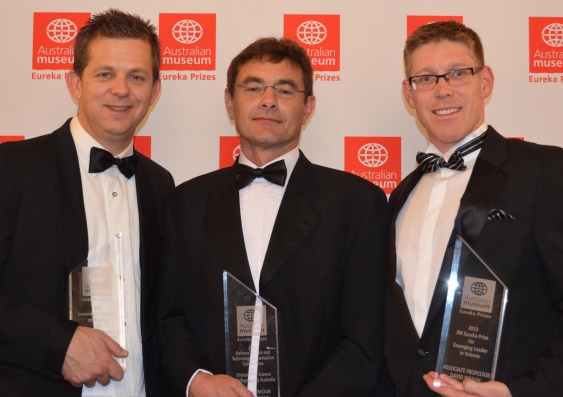Triple Eureka win
Research projects on evolution, dingoes, and the battle against HIV/AIDS have won three UNSW scientists prestigious Australian Museum Eureka Prizes.
Research projects on evolution, dingoes, and the battle against HIV/AIDS have won three UNSW scientists prestigious Australian Museum Eureka Prizes.

Research projects on dingoes, evolution, and the battle against HIV/AIDS have won three UNSW researchers prestigious Australian Museum Eureka Prizes.
Winners of the 2013 awards, dubbed the “Oscars of Science”, were announced on September 4 at a gala dinner in the Sydney Town Hall, attended by more than 700 science, government, cultural and media leaders.
Associate Professor David Wilson, of the Kirby Institute, won the Eureka Prize for Emerging Leader in Science. He oversees Australia’s surveillance system for HIV, viral hepatitis, and sexually transmissible infections and is recognised by the World Bank, UNAIDS and the World Health Organisation as the Asia-Pacific region’s key program evaluator.
His life-saving research has included mathematical modelling of HIV and hepatitis C transmission showing the effectiveness of needle-syringe programs, and his promotion of evidence-based treatment of AIDS in Armenia, which reversed a rising trend in HIV infection linked to use of an unproven drug.
Professor Rob Brooks, director of the Evolution and Ecology Research Centre, won the Eureka Prize for Promoting Understanding of Australian Science Research.
One of Australia’s most prolific science writers, he was commended for his ability to communicate complex ideas without trivialising them.
In the past two years he has published an award-winning book – Sex, Genes and Rock ‘n’ Roll: How Evolution has Shaped the Modern World. He has also written 16 articles and 44 columns for The Conversation, featured in an ABC TV Catalyst special, given many print, radio and TV interviews and presented a host of public lectures.
Dr Mike Letnic, of the School of Biological, Earth and Environmental Sciences, was part of a team that won the Eureka Prize for Environmental Research.
Their research shows that dingoes – rather than being vermin, as is often claimed – help control kangaroo populations and can assist land managers in the control of invasive species such as foxes and feral cats.
Ecosystems with dingoes present have better vegetation conditions and more diverse and abundant populations of small native mammals.
The award’s 52 finalists were chosen from more than 1000 entries and competed for a share of the $170,000 In 17 prize categories including research and innovation, leadership and commercialisation and school science and science journalism.
Other UNSW finalists in five categories of the 2013 awards were Scientia Professor Michelle Simmons; Scientia Professor Veena Sahajwalla; Scientia Professor Justin Gooding along with Professor Katherina Gaus and Dr Peter Reece; members of the Bionic Vision Australia team; Dr Jason Sharples; and Professor Michelle Haber along with Professor Murray Norris and Professor Glenn Marshall.
Media contacts:
Associate Professor David Wilson: dwilson@unsw.edu.au
Professor Rob Brooks: rob.brooks@unsw.edu.au
Dr Mike Letnic: m.letnic@unsw.edu.au
UNSW Science media: Deborah Smith, 9385 7307, 0478 492 060, deborah.smith@unsw.edu.au
VIDEO: Associate Professor David Wilson, the winner of the 3M Eureka Prize for Emerging Leader in Science